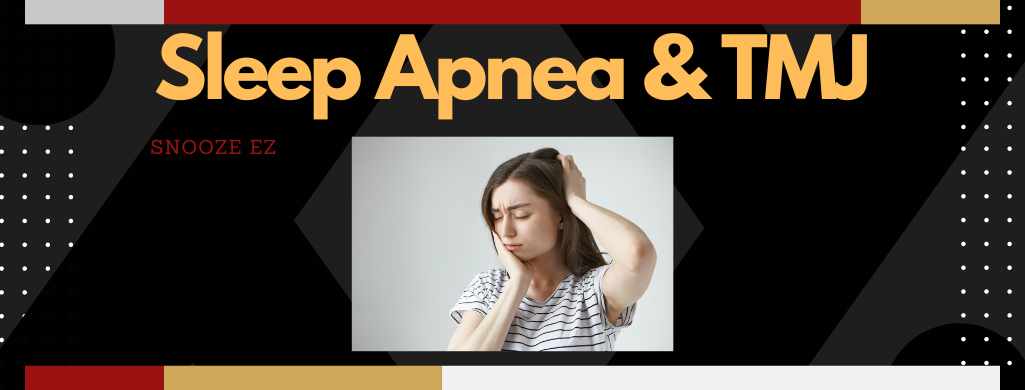TMJ, or temporomandibular joint disorder, is a condition that affects many. It causes pain and discomfort in the jaw joint, making it difficult to chew, speak, and even sleep. It can also even cause head, ear, and neck pain. But, can TMJ also lead to sleep apnea?
Sleep apnea is a common sleep disorder that affects more than 22 million Americans. It is characterized by pauses in breathing during sleep, which can lead to a range of health problems, including high blood pressure, heart disease, and stroke. TMJ and sleep apnea may seem like unrelated conditions, but recent studies suggest that they may be linked.
If you’re suffering from TMJ, you may be wondering if it could also be the cause of your obstructive sleep apnea (OSA). In this article, we will explore the connection between TMJ and slepp apnea, and discuss the symptoms, causes, and treatment options for both conditions. Understanding the link between TMJ and sleep apnea can help you get the right diagnosis and treatment, so you can get a good night’s sleep and wake up feeling refreshed and energized.
Can TMJ cause sleep apnea?
Yes, it is possible for TMJ to cause obstructive sleep apnea. TMJ can lead to airway obstruction, which can result in pauses in breathing during sleep. In some cases, TMJ-related airway obstruction may be the primary cause of sleep apnea or it may contribute to it making current symptoms worse.
The most common symptoms of TMJ-related sleep apnea include jaw pain along with loud snoring and frequent pauses in breathing during the night. It is also important to note that people with TMJ may experience jaw clenching while sleeping, making it more difficult to keep the upper airway open. This can further contribute to the development of sleep apnea.
How are TMJ and sleep apnea related?
The link between TMJ and sleep apnea can be twofold. On the one hand, TMJ can cause airway obstruction, which can lead to pauses in breathing during sleep. This can result in a decrease in oxygen levels, often leading to loud snoring and other signs of sleep apnea.
On the other hand, sleep apnea itself can contribute to the development of TMJ due to increased jaw clenching while sleeping. This is because when your body experiences pauses in breathing during sleep, your facial muscles instinctively tighten up as a reflexive response. This tightening of the jaw muscles can aggravate existing TMJ symptoms or even lead to new ones.
Therefore, jaw clinching can be a symptom of both sleep apnea and TMJ making it more difficult to identify which is causing the other to happen.
TMJ and Sleep Apnea Treatment
Treating both conditions is essential for reducing their symptoms and preventing further complications . For TMJ, treatment typically includes therapies such as physical therapy and lifestyle modifications.
For sleep apnea, treatments may include oral appliance therapy, positive airway pressure (CPAP) machines, and lifestyle changes. In some cases, surgery may be recommended to resolve both conditions.
Can a misaligned jaw cause sleep apnea?
Now that we have covered the TMJ/sleep apnea relation, you may be wondering if having a misaligned jaw could cause sleep apnea.
Yes, a misaligned jaw, such as having an overbite or underbite, can contribute to sleep apnea as well. If the jaw is misaligned, it can lead to airway obstruction and difficulty breathing while sleeping similiar to TMJ. This is because a misalignment can cause narrowing of the upper airway, making it more difficult for air to get through. Additionally, if the jaw is not aligned properly, the muscles around it may tense up during sleep and make the airway even narrower. This can further contribute to episodes of sleep apnea.
To address this issue, doctors may recommend treatments such as orthodontic braces, or jaw surgery. These treatments can help to realign the jaw and improve muscle function in order to reduce episodes of sleep apnea. Additionally, lifestyle modifications such as avoiding alcohol and sleeping on your side can also help to reduce airway obstruction and improve sleep quality.
Conclusion
TMJ can cause sleep apnea and a misaligned jaw can also cause the same issue. Sleep apnea can also cause TMJ. Treatment for all of these conditions should be sought in order to improve sleep quality, quality of life, and reduce symptoms.
Treatments such as physical therapy, lifestyle modifications, oral appliance therapy, CPAP machines, orthodontic braces, and jaw surgery may all be recommended depending on the severity of your condition.
It is important to reach out to your family doctor with your concerns, then if needed, they can refer you to a sleep specialist.


